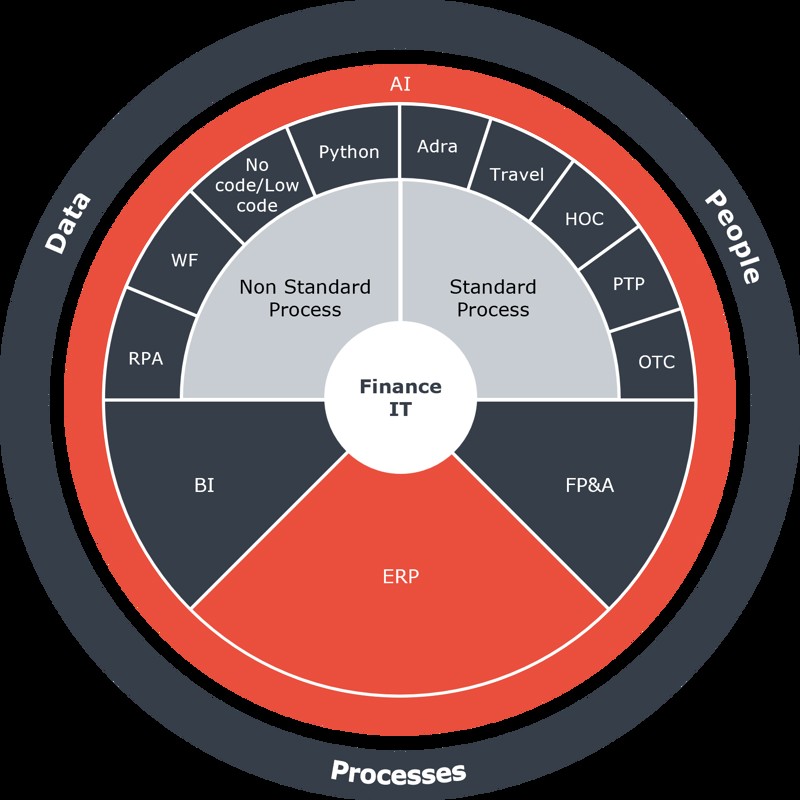Perhaps you’ve been speculating about it for quite some time. And now you have reached the conclusion that you need a new ERP system. You may even have decided which ERP system to acquire. So far so good. But now the next question arises: Who would be the right partner to collaborate with about the delivery of your new ERP system? To clarify that, we give you seven questions below that you should ask your (perhaps) future ERP supplier.
ERP projects are generally business-critical and costly and may potentially have profound consequences if things don’t turn out as planned. That’s why it’s important to choose the right partner. And perhaps ERP implementation isn’t your greatest field of expertise.
That’s why it may be difficult to decide on the various accompanying considerations.
So how do you prepare for choosing an ERP supplier? You can learn more about that right here. You can begin by asking your ERP supplier seven key questions as part of your selection process:
- Will our solution be bound to you as a supplier?
- What experience do you bring to the table?
- Which competences do you have in addition to the area of ERP?
- Which approach do you have to the project?
- What kind of training and support do you offer?
- What do you do as regards GDPR and IT security?
- What are your prices?
1. Will our solution be bound to you as a supplier?
ERP projects generally last several years. Therefore, your collaboration with the ERP supplier should, preferably, be as one long, happy marriage. But if something goes wrong, it is important to separate relatively painless.
That’s why you should have a closer look at the suppliers to assess whether your solution will be bound to them as suppliers.
Companies may be bound to their ERP supplier for the following three reasons:
- They are sold an on-premise solution that it’s almost impossible to transfer to another supplier instead of a cloud solution that is generally easily transferable.
- Public apps that aren’t public beneath the surface and that can be used only for as long as you are customers of the supplier. It may make it difficult to change to another supplier if the apps concerned are at the core of your solution.
- Apps developed by the supplier are installed, which other suppliers will not take over and support.
2. What experience do you bring to the table?
When you are to implement your ERP project, not only the name of the supplier is important. The team that the supplier makes available to you is also extremely important. You would, after all, like to be certain that the supplier has done the same before successfully and has experience that is of relevance in connection with your kind of business. Furthermore, you would like to ascertain that the supplier has various competences and is, thus, in control of everything from technical issues to project management, and that you are not dependent on only one single person.
Therefore, you should ask about the roles that the supplier will assume, the names of the allocated resources per role in the team that will be dedicated to you and these persons’ experiences.
It would also be a good idea to ask for relevant experience with customers like you and have the supplier elaborate on how they intend to solve the core of your ERP challenge or the greatest problem that you are facing with your current solution.
As a SaaS company, you can for example ask how the supplier intends to solve the invoicing of contracts month after month and to report on SaaS key figures. If you are a trading company, it would be relevant to consider whether the supplier has built integrations for a web-shop platform before. And, not least, which solution they can offer for optimisation of your supply chain, such as mobile inventory scanners, procurement forecasts, etc.
When building you ERP solution, some suppliers will offer a complete configuration that they will use as their point of departure and adjust to you. While other suppliers will build almost everything from scratch.
The latter may quickly result in an increase of project scope and costs. Therefore, it may be advantageous to find a supplier who will prioritise a thorough pre-configuration.
In this way, you avoid reinventing sliced bread, but will benefit from much experience combined into a best practice configuration. Then, you’ll get a thoroughly tested solution and get started quickly.
Therefore, you should ask the supplier how much has been pre-configured. And if you would like to examine into even more detail, you can examine whether the elements below have been pre-configured:
- Chart of accounts
- Making entries impossible on system accounts
- Book-keeping set-up
- VAT book-keeping set-up
- Installation set-up
- Periodisation codes
- Intercompany accounting framework.
3. Which competences do you have in addition to the area of ERP?
Sooner or later, your solution will require competences other than those merely related to ERP. Even the most skilled ERP consultants cannot always find a good standard solution and, therefore, your implementation will need coding, workflows, and the like. Or perhaps you would like to automate many functions, to create BI reports, and to implement a CRM system.
Therefore, you should examine which competences the supplier has overall. The right competences will boost the delivery and your business – both in the short and the long term.
4. Which approach do you have to the project?
When choosing a supplier, you want to make sure that the company has a carefully prepared approach and a plan for how to approach the project. Therefore, you should examine how they intend to approach the project and consider whether it makes sense.
In general, it is relevant to find a balance between various project management models, including the waterfall model and an agile process. The waterfall model accommodates the same needs as the solution you already have, and with the agile process you will reduce the complexity. And a thorough pre-analysis is needed to capture the necessary complexity and the methods that you want to be used for your projects.
It is our recommendation that all aspects that may be considered a further development of what you have today are driven as subsequent phases according to an agile project method. Thus, the project will not be unnecessarily complex.
5. What kind of training and support do you offer?
A new ERP system also creates a need for training and support of your employees, who must become familiar with the new system. How much and how suppliers offer training and support may differ much.
Does training take place physically at the supplier’s premises, on-site or remotely? And is the course material used standard material, or is on-site person-to-person training offered aimed at your specific needs? Will the suppliers train your super users who will subsequently train and support your other users, or will they train and support all your users? There are a multitude of questions to ask.
We recommend that you also ask how much documentation will be prepared in the form of process drawings and work descriptions during the project period for your employees’ subsequent consultation.
During the transition phase – until your complete transfer to the new system – you will, no doubt, need extra support so you should examine for how long the implementation team will be dedicated to the project before you are referred to support as such.
Also consider whether there is a guaranteed response time, statistics on the supplier’s average response time and solution of problems, opening hours, through which channels the support takes place, how highly the support is rated by the customers, and which payment models apply to support.
Then, it becomes easier for you to assess whether it will meet your needs based on your knowledge of your employees’ system understanding.
6. What do you do as regards GDPR and IT security?
If your IT department has specific requirements for GDPR and IT security, or if you buy an on-premise solution hosted by your supplier, you should remember to check how they handle GDPR and IT security issues. This is, after all, an area in which it would be a pity to be surprised late in the process.
7. What are your prices?
Normally, customers’ first question concerns the economy. But we have saved this for last because it is important to be careful. We have several examples of companies that chose the least costly solution without paying attention to the fact that they were bound to the supplier’s defective solution.
So, how will you find the right price?
You can ask about the expected economy of the project, including the payment model with pre-payment versus current payment or final settlement. And ask for clarification of the hourly rates, any project discount, as well as the hourly rate for subsequent support.
When comparing suppliers’ prices, you should weigh the pros and cons of their scores on the other parameters unveiled through the six questions above. Because … it may soon become expensive to choose the least costly solution.
If there is a distinct difference in the price of the entire project, we would recommend you to consider the preconditions. Perhaps one supplier has included time to help you get started, load, and set up basic data, test and document processes, etc., while another supplier will deliver merely a raw installation and a standard configuration and leave the rest to you.
Those were the seven questions that – based on our experience – should make you wiser about the suppliers that you contact. And – not least – make it easier for you to make a choice. However, the questions can rarely stand alone, and a selection process is often a complex affair.
Read this and more articles in Danish in the magazine Content here.
Competences – full-circle
When helping a Finance function digitalise and automate, we take pride in combining the applications and tools that will meet your specific demands. In a way so that the solution supports the data, processes and people working hard behind the lines.

Basico's digitalisation circle

Do you need sparring?
Many questions and issues need to be solved before you decide whether to launch an ERP project or not.
If you need to clarify which possibilities you have in the light of your current ERP system, do not hesitate to contact us.

 en
en
 da
da



